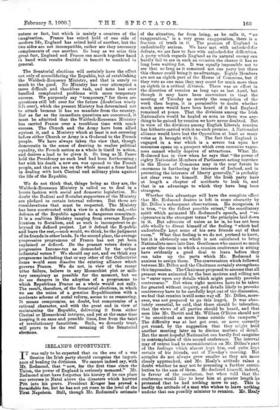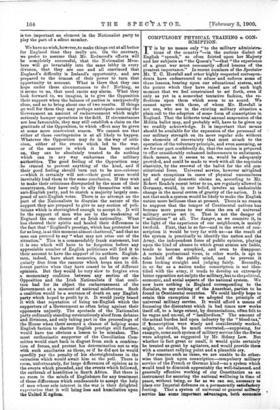IRELAND'S OPPORTUNITY.
IT was only to be expected that on the eve of a war Session the Irish party should recognise the import- ance of healing its divisions. We cannot indeed say, with Mr. Redmond, that " now, for the first time since the Union, the power of England is seriously menaced." Mr. Redmond must have forgotten his history if be can place our reverses in Natal above the disasters which hurried Pitt into his grave. President Kruger has proved a formidable foe, but he has not yet risen to the level of the 'First Napoleon. Still, though Mr. Redmond's estimate of the situation, far from being, as he calls it., "130 exaggeration," is a very gross exaggeration, there is a fraction of truth in it. The position of England is undoubtedly serious. We have met with unlooked-for defeats, we are face to face with unlooked-for difficulties.
A party which regards England as its natural enemy can hardly fail to see in such an occasion the chance it has so long been waiting for. It was equally impossible not to see that so long as it remained not one party but three this chance could bring it no advantage. Eighty Members are not an eighth part of the House of Commons, but if they vote as one mau they may count for much more than an eighth in a critical division. There was an effort in the direction of reunion as long ago as last April, but though it may have been convenient to treat the meeting of Tuesday as merely the completion of the work then begun, it is permissible to doubt whether much more would have been heard of it had England remained at peace. That the divisions among the Irish Nationalists would be healed so soon as there was any- thing to be gained by reunion we have never doubted. But in view of the divisions among English Liberals reunion has hitherto carried with it no such promise. A Nationalist alliance would have lost the Opposition at least as many votes as it brought with it. The fact that England is engaged in a war which is a severe tax upon her resources opens up a prospect which even excessive vague- ness cannot wholly deprive of attractions. What Mr. Redmond has in view when he says that " the power of eighty Nationalist Members of Parliament acting together in the House of Commons may in the near future be enormous in furthering the interests of Ireland, and in protecting the interests of liberty generally," is probably not clear even to himself. But the Irish party have at length a chapter of accidents to look to, and that is an advantage to which they have long been strangers.
Whether this advantage will have the complete effect that Mr. Redmond desires is left in some obscurity by Mr. Dillon's subsequent observations. He recognises, it is true, "to the fullest possible extent," the conciliatory spirit which animated Mr. Redmond's speech, and "re- ciprocates in the strongest terms" the principles laid down in it. But advocate of union as he is, he has not been able wholly to divest himself of the feeling " which had undoubtedly kept some of his own friends out of that room." What that feeling is we do not pretend to know, but it is obviously one which is not calculated to bring Nationalists more into line. Gentlemen who cannot so much as enter the room in which a reunion conference is sitting have evidently a good deal to learn before they can take up the parts which Mr. Redmond is anxious to assign them. The conversation which followed between Mr. Dillon and the Chairman certainly strengthens this impression. The Chairman proposed to assume that all present were animated by the best motives and willing not to " enter upon any details which might possibly provoke controversy." But when right motives have to be taken for granted without inquiry, and details likely to provoke controversy have to be carefully kept out of the discussion, we feel that reunion is still some way off. Mr. Dillon, more- over, was not prepared to go this length. It was abso- lutely essential, he said, that there should be toleration, that the views of all parties should be heard, and that men like Mr. Davitt and Mr. William O'Brien should not " be considered as mere items outside the ramparts." The difficulty was at last got over, or more correctly got round, by the suggestion that they might hold another meeting later on to discuss matters of detail. But the most hopeful Nationalist can hardly feel sanguine in contemplation of this second conference. The interval may of course lead to reconsideration on Mr. Dillon's part of the feelings which almost kept him, and quite kept certain of his friends, out of Tuesday's meeting. But scruples do not always grow smaller as they are more closely approached, and Mr. Healy's attitude raises a doubt whether he may not be preparing a further contri- bution to the sum of them. He declared himself, indeed, in favour of the resolution, but when told that the conference would like to hear him at greater length he protested that he had nothing more to say. This is hardly the attitude of a man who wishes to leave nothing undone that can possibly minister to reunion. Mr. Healy is too important an element in the Nationalist party to play the part of a silent member.
We have no wish, however, to make things out at all better for England than they really are. On the contrary, we prefer to assume that Mr. Redmond's efforts will be completely successful, that the Nationalist Mem- bers will go invariably into the same lobby in every division, that they are one and all convinced that England's difficulty is Ireland's opportunity, and are prepared to the utmost of their power to turn that opportunity to account. What is there that they can hope under these circumstances to do ? Nothing, as it seems to us, that need excite any alarm. What they look forward to, we imagine, is to give the Opposition their support when the balance of parties is unexpectedly close, and so to bring about one of two results. If things go well for them they may perhaps anticipate causing the Government an amount of embarrassment which might seriously hamper operations in the field. If circumstances are less favourable, they may still establish a claim on the gratitude of the Opposition, to which effect may be given at some more convenient season. We cannot see that either of these contingencies is at all likely to happen. Whatever the Opposition may do in the way of criti- cism, either of the events which led to the war, or of the manner in which it has been carried on, they can be absolutely trusted to do nothing which can in any way embarrass the military authorities. The good feeling of the Opposition may be trusted to prevent anything of the kind, and if their good feeling should turn out to be non-existent —which it certainly will not—their good sense would inevitably lead them to the same conclusion. If they wish to make their criticisms disregarded by the mass of their countrymen, they have only to ally themselves with an anti-English party, and to snatch a majority largely com- posed of anti-English votes. There is no attempt on the part of the Nationalists to disguise the nature of the support they are prepared to give to any section of poli- ticians which is shortsighted enough to accept it. It will be the support of men who see in the weakening of England the one chance of an Irish nationality. What has cheered their spirits and healed their differences is the fact that "England's prestige, which has protected her for so long, is at this moment almost shattered," and that no man can pretend to say " what may not arise out of the situation." This is a commendably frank statement, but it is one which will have to be forgotten before any appreciable number of English politicians will find it to their account to have the support of its authors. English- men, indeed, have short memories, and they are sin- gularly free from the rancour which keeps men in dif- ferent parties when they have ceased to be of different opinions. But they would be very slow to forgive even a momentary coalition between any section of the Opposition and the Irish Nationalists if that coali- tion had for its object the embarrassment of the Government at a moment of national misfortune. Such a coalition would be a sentence of death on any English party which hoped to profit by it. It would justly brand it with that reputation of being un-English which the supporters of a Government so often bring against their opponents unjustly. The spectacle of the Nationalist party ordinarily standing ostentatiously aloof from debates and divisions, and only taking part in the proceedings of the House when there seemed a chance of helping some English faction to shatter English prestige still further, would have too obvious a lesson to be mistaken. The most enthusiastic supporter of the Conciliation Com- mittee would start back in disgust from such a combina- tion of forces, and protest his determination not to win with such auxiliaries as these, or if he did not he would speedily pay the penalty of his shortsightedness in the ostracism which would await him at the poll. There is room, unfortunately, for large differences of opinion as to the events which preceded, and the events which followed, the outbreak of hostilities in South Africa. But there is no room in the minds of Englishmen for any treatment of those differences which condescends to accept the help of men whose sole interest in the war is their delighted expectation that it will bring loss and humiliation upon the United K ngdom.







































 Previous page
Previous page